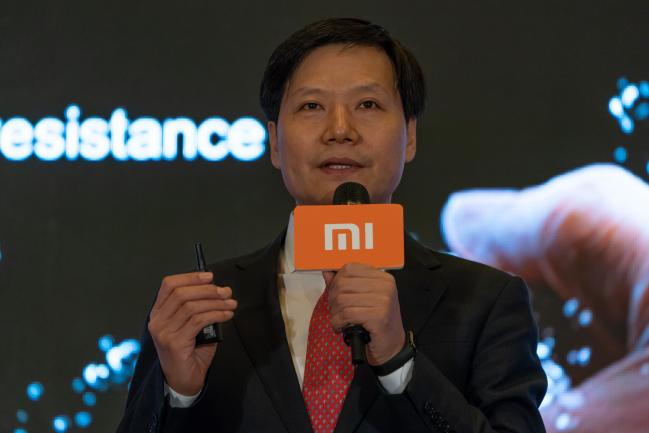(Bloomberg) -- (Bloomberg) -- It was hailed as the biggest and most important Chinese technology debut in years. Instead, Xiaomi Corp. begins life as a public company on the defensive, struggling to justify a lofty valuation while buffeted by a geopolitical storm beyond its control.
When billionaire Chairman Lei Jun strikes the gong on Monday in Hong Kong, he will usher onto public markets a company twice as expensive as Apple Inc (NASDAQ:AAPL). that is pitching itself as a high-growth internet play on par with the likes of Facebook Inc (NASDAQ:FB). At about $50 billion, Xiaomi will become the world’s third-largest publicly-traded maker of mobile devices, a standard-bearer for Chinese corporations seeking to become global players and leaders in technology.
That vision will soon get tested: institutional investors saw bids on the gray market 11 percent below the initial public offering price. That’s after Xiaomi’s IPO came in at the very bottom of a marketed range. If that level holds during actual trade, it may have a chilling effect on a swathe of tech corporations keen on raising capital this year to fuel their ambitions, from Meituan Dianping to Tencent Music. Longer-term however, Xiaomi’s expanding global footprint may help it grow into its valuation.
“The valuation I’ve put in our analysis is still aggressive for Xiaomi. But its aggressive for a reason and that’s obviously because Xiaomi has a very interesting footprint,” said Peter Garnry, head of equity strategy for Saxo Bank. “The trade war could deal a negative impact on consumer sentiment in general, not only in China but also in the U.S. and globally. I think it’s the main risk.”
Xiaomi’s tribulations began almost the moment it embarked on its IPO journey. It’d planned on raising about $10 billion and a valuation of as much as $100 billion by taking advantage of Chinese depositary receipts: a new instrument Beijing pushed to entice companies to list at home. But that fell apart when it couldn’t adequately address 84 questions posed by regulators.
Key among those queries: why a company that gets the vast majority of revenue from phones would pitch itself as an internet company, putting it at a higher price tag than Tencent Holdings Ltd.
When Xiaomi finalized its offer, it did so just as the Hong Kong bourse went into a tailspin. Escalating tensions with the U.S. exacerbated growing concerns about the fallout from a slowing Chinese economy, fueling a climate of uncertainty. Compounding the challenge: traders can short-sell the stock from day one and Xiaomi won’t be considered for inclusion in benchmark MSCI gauges.
“It’s not looking like a very positive IPO to be honest,” said Andrew Jackson, head of Japanese equities at Soochow CSSD Capital Markets, who’s been monitoring Xiaomi and thinks it too richly valued. “It’s a wake-up call for realistic valuations, but its also a case of bad luck for Xiaomi’s timing.”
But Xiaomi may have no choice. Its last equity fundraising was in 2014 and it needed to bankroll Lei’s vision of expanding globally and embracing technology from artificial intelligence to cloud computing, areas where it would be pitted against Alibaba (NYSE:BABA) Group Holding Ltd. and Baidu Inc (NASDAQ:BIDU).
Lei, who once drew comparisons in domestic media to Steve Jobs, has even resumed taking potshots at Apple. It’s a far cry from a year or so ago, when the billionaire prompted a bout of internal soul-searching via a heartfelt missive after sales flatlined in 2016.
It remains to be seen whether Xiaomi’s been penalized for circumstances beyond its control. The company has urged investors to recognize its worth as one of the few from China’s tech sector to make inroads abroad.
It’s taken pains to explain its strategy of selling cheap phones to goose revenue from services such as video and music, while investing in an ecosystem of connected devices from vacuums to watches.
“The problem with Xiaomi is that people are very confused. They are not clear about why you call yourself an internet company,” said Anthea Lai with Bloomberg Intelligence. “Many people won’t feel comfortable paying a price similar to Tencent, which has a proven track record, and a 100 percent of its profit came from internet.”
To contact Bloomberg News staff for this story: Gao Yuan in Beijing at ygao199@bloomberg.net
To contact the editors responsible for this story: Robert Fenner at rfenner@bloomberg.net, Edwin Chan
©2018 Bloomberg L.P.
